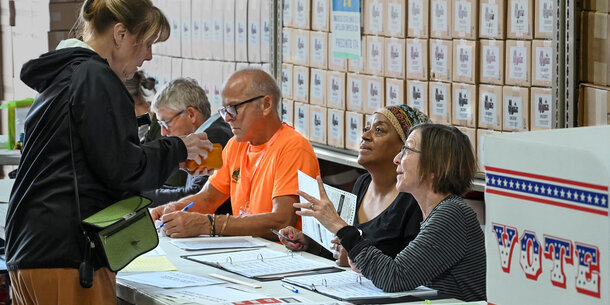On Election Day 2024, a local Arizona election official received an email from an unknown sender warning they had planted a bomb at her office, where voters were dropping off ballots and staff were overseeing operations at polling places throughout the county. The message said there would “be many wounded people when it explodes.” It was just one of at least 227 bomb threats that targeted polling locations, election offices, and tabulation centers around the country on Election Day and the days after.
Fortunately, in this county and others, election officials and law enforcement partners across the local, state, and federal level sprang into action. Indeed, many had planned for this exact type of incident.
But now, significant cuts to federal resources, services, and guidance for election security threaten to undermine the coordinated efforts that prepare election officials for such scenarios. However, states can help provide officials with the support they need to navigate and prevent attacks in time for the 2026 election.
A new report by the Brennan Center and the R Street Institute, “A State Agenda for Election Security and Resiliency,” provides state leaders with concrete recommendations — informed by innovative state models — for how states can secure elections through a whole-of-government approach.
Lawmakers can set baseline security requirements and provide election officials with sufficient funding to run secure elections. Governors can organize and lead state officials to contribute expertise, training, and resources. Law enforcement leaders can deter attacks on elections and hold perpetrators accountable. Elections and security officials can establish and join interstate information-sharing networks to prepare for developing threats. And all public leaders can clearly express that attacks on the workers and systems that run our elections will not be tolerated.
The bomb threats in 2024 show how these coordinated approaches can help election officials respond to security threats and mitigate harm to voters. In Georgia, where at least 60 bomb threats targeted polling places or election offices, Secretary of State Brad Raffensperger and other state officials had supported election security partnerships with law enforcement and hosted regional scenario planning exercises, bringing together local election officials and police to practice coordinated responses to bomb threats and other similar events. Moreover, information sharing networks built up over the last eight years delivered real time data to key officials as the events unfolded throughout the day, allowing law enforcement to quickly assess the situation and search the impacted facilities to confirm there was no active threat. Because of these coordinated efforts, disruptions to the voting process were brief and minor.
Investigations into bomb threats determined that many appeared to originate from Russian email domains, and none were credible. Yet without preparation, education, and collaboration, these simple communications could have caused chaos, closing polling places for hours and leading to public fears of safety that kept voters at home.
And they are far from the only threats and attacks that elections face. In Oregon and Washington State, explosive devices detonated on ballot drop boxes, damaging hundreds of ballots in the process. Multiple election officials were “swatted” — targeted by false calls to police intended to trigger a potentially dangerous law enforcement response — amidst a general increase in threats, abuse, and harassment directed at election officials.
Cyberattacks also continue to threaten elections. State and local governments have seen a rapid increase in both the frequency and intensity of malware attacks, ransomware incidents, and data breaches in recent years as adversarial nation-states and criminals seek profit and disruption. In 2022, Mississippi’s state election website went down on Election Day due to a cyberattack, and in 2024, Georgia fended off a similar attempted attack that according to state officials had “the hallmarks of a foreign power.”
In the face of these evolving security threats, states need a strategy to ensure that attacks, disruptions, and other incidents do not impact the ability of voters to cast ballots and election workers to count them. While these concerns are top of mind for election officials, they cannot go it alone. An all-hands-on-deck effort is needed, with contributions from leaders across state government.
Following the federal government’s widespread cuts to resources, expertise, and guidance that election officials have relied on for years, state leadership on election security is more critical than ever. The Trump administration has frozen the Cybersecurity and Infrastructure Security Agency’s election security support programs, cut key personnel who worked with election officials to defend systems from cyber and physical threats, and ended funding for information-sharing networks that provided election officials with nationwide visibility into emerging attacks.
The Trump administration has not only cut critical support for election security but also may already be undermining security by attempting to interfere with voting systems. A Department of Homeland Security official and an individual claiming to work for the administration have reportedly asked local election officials for access to their voting equipment. State attorneys general and other officials must be prepared to help election officials here too — without proper guidance and assistance, these requests for access could lead to legal risks for election officials and security risks for election systems.
Sixty percent of local election officials said that they are concerned about federal cuts to election security services, according a recent survey by the Brennan Center. Eighty-seven percent of local officials said that it was important for state and local governments to provide additional resources to make up for the reduced support. Overwhelming majorities also believe that it is important for government to provide services like election security training, cybersecurity assessments, and incident response assistance to local election officials. If the federal government is not going to provide these services any longer, the responsibility falls to states.
The 2024 election made clear that security threats are not going away. But it also confirmed effective ways to prevent, mitigate, and respond to these threats: collaboration, coordination, and communication by officials across state and local government. As the federal government leaves local election officials behind, state leaders must step up and protect American democracy.





